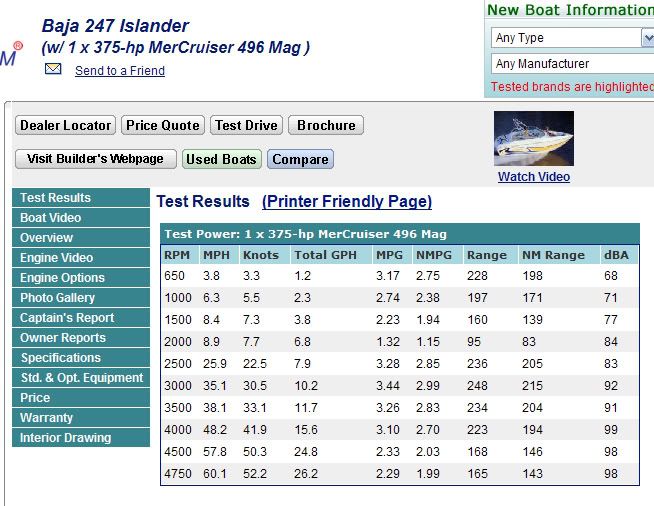This is my first post so please be gentle!!!
I am hoping to purchase my first new to me boat next year. It will unfortunately be 2009 before the finances are right to allow me to buy a boat. My budget will likely be $5k or less. I am looking in the 18-19 ft bowrider range. Will be used for general cruising, some watersports (as the kids get older), and fishing. I live in central NC so the winters are not harsh and I can see using the boat almost year round, particularly for fishing. Fresh water only.
So my question is this. And I know it has probably been asked a thousand times in a thousand different ways but here goes.
I am trying to decide the I/O vs. OB thing. I have read all the comparisons and based on what I have read and what my situation will be, OB doesn't sound like a bad thing. I like that I don't have to winterize it. Due to our relatively mild climate here, I would hate to have a nice fall or spring day and not be able to go fishing because my I/O was winterized. Nice to be able to hitch up and go and then just drain the engine after with no worries. I also will be doing all my own maintenance/repairs (I am quite mechanically inclined - albeit no experience with marine engines - but I can learn) so I like the easier maintenance and access that the OB provides.
But I am also worried about fuel economy (who isn't). Given the age of the boat that will likely fall in my budget range, I doubt I will find one with a 4-stroke OB. So the question is, how much more fuel will a 2-stroke OB use compared to a comparable I/O. Say a 115 hp OB as compared to the 3.0L I/O?
Trying to look at all the angles here so I appreciate all the wisdom and experience you all can bestow on me!!
Sorry for the long initial post and thanks in advance!!!
I am hoping to purchase my first new to me boat next year. It will unfortunately be 2009 before the finances are right to allow me to buy a boat. My budget will likely be $5k or less. I am looking in the 18-19 ft bowrider range. Will be used for general cruising, some watersports (as the kids get older), and fishing. I live in central NC so the winters are not harsh and I can see using the boat almost year round, particularly for fishing. Fresh water only.
So my question is this. And I know it has probably been asked a thousand times in a thousand different ways but here goes.
I am trying to decide the I/O vs. OB thing. I have read all the comparisons and based on what I have read and what my situation will be, OB doesn't sound like a bad thing. I like that I don't have to winterize it. Due to our relatively mild climate here, I would hate to have a nice fall or spring day and not be able to go fishing because my I/O was winterized. Nice to be able to hitch up and go and then just drain the engine after with no worries. I also will be doing all my own maintenance/repairs (I am quite mechanically inclined - albeit no experience with marine engines - but I can learn) so I like the easier maintenance and access that the OB provides.
But I am also worried about fuel economy (who isn't). Given the age of the boat that will likely fall in my budget range, I doubt I will find one with a 4-stroke OB. So the question is, how much more fuel will a 2-stroke OB use compared to a comparable I/O. Say a 115 hp OB as compared to the 3.0L I/O?
Trying to look at all the angles here so I appreciate all the wisdom and experience you all can bestow on me!!
Sorry for the long initial post and thanks in advance!!!






















